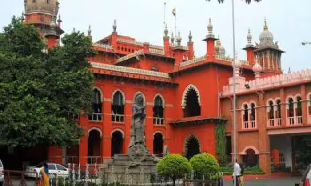The Madras High Court has ordered a Special Investigation Team (SIT) to investigate the case of a 19-year-old engineering student who was sexually assaulted on the Anna University campus in Chennai.
The incident took place on December 23, 2023, when the survivor, a second-year student, was sitting in an open area with her male friend.
The accused, identified as 37-year-old Gnanasekaran, allegedly attacked the male friend before dragging the survivor behind a building and sexually assaulting her. The police arrested the accused after the survivor filed a complaint.
The Madras High Court, led by Justices SM Subramaniam and V Lakshminarayan, responded to the case with strong measures.
The court criticized the Tamil Nadu Police for serious lapses, particularly regarding the public disclosure of the survivor’s identity in the First Information Report (FIR) available on the police website.
In light of these mistakes, the court ordered the Tamil Nadu government to provide interim compensation of ₹25 lakh to the survivor. Furthermore, the court instructed the police to ensure protection for the survivor and her family.
Formation of SIT and Investigation Lapses
The court also took action by ordering the formation of a Special Investigation Team (SIT) to handle the investigation. The SIT is to be comprised of three officers from the Indian Police Service (IPS).
The bench noted that there were significant lapses in the initial handling of the case, and the investigation was not proceeding as it should have been. The decision to form an SIT underlines the seriousness with which the court views the case.
Criticism of FIR and Victim Blaming
A significant aspect of the court’s ruling was its criticism of the language used in the FIR. The FIR contained details that the court described as “victim blaming.”
The survivor had alleged that the accused recorded intimate moments between her and her boyfriend, and then threatened to share the footage with her family and college authorities.
The court deemed this language “deplorable,” stating that it contributed to victim shaming and mental distress for the survivor.
The bench expressed shock at how the FIR had been drafted, suggesting that it resembled something one might find in a boys’ hostel, filled with judgmental assumptions about the survivor’s actions.
The court emphasized that the FIR violated the survivor’s rights to dignity and bodily autonomy, as guaranteed under Article 21 of the Indian Constitution.
National Commission for Women’s Intervention
The National Commission for Women (NCW) also took immediate action after the incident. The NCW condemned the assault in the strongest possible terms and expressed support for the survivor in her pursuit of justice.
Taking suo motu cognizance of the case, the NCW formed a fact-finding committee to investigate the details of the assault.
The commission highlighted that the accused had a history of criminal behavior and suggested that the negligence of the Tamil Nadu Police had emboldened him to continue his criminal actions.
The NCW further directed the Tamil Nadu DGP to ensure that the survivor received medical care and protection. It also recommended adding Section 71 of the BNS Act, 2023, to the FIR to impose stricter penalties on the accused.
The NCW emphasized the need for accountability at every level, especially in light of the police’s mishandling of the case. It called for action against officers who publicly revealed the survivor’s identity, which is a violation of Supreme Court guidelines.



